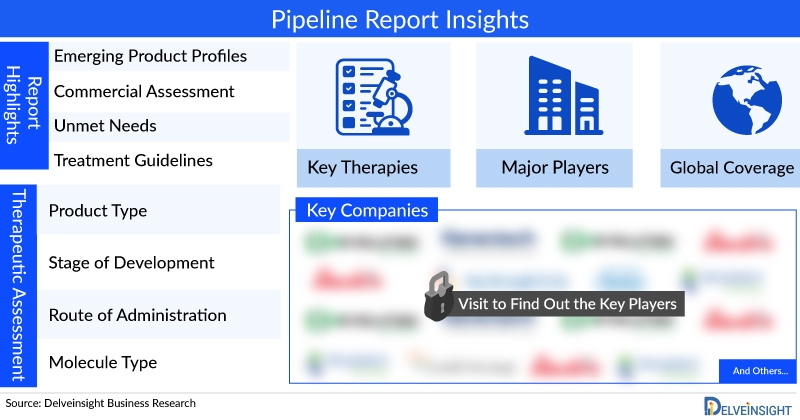DelveInsight’s “Metastatic Merkel Cell Carcinoma – Pipeline Insight, 2025” highlights an expanding portfolio of investigational therapies spanning immunotherapies, targeted agents, and next-generation biologics. Novel immune checkpoint modulators, including LAG-3, TIGIT, and CTLA-4 inhibitors, are being studied in combination strategies to overcome resistance and boost response rates. Oncolytic viruses, cancer vaccines, and T-cell–based therapies are advancing in clinical stages, aiming to enhance tumor-specific immune activation. In parallel, precision-targeted agents such as PI3K/AKT/mTOR inhibitors, epigenetic modulators, and antibody-drug conjugates are under evaluation to address molecular vulnerabilities in MCC tumors.
The 2025 mMCC pipeline reflects a paradigm shift toward combination regimens and biomarker-driven innovation, aiming to expand survival benefits and overcome current therapeutic limitations. Backed by regulatory incentives for rare cancers, increasing clinical collaborations, and rising investment in immuno-oncology, the future landscape of metastatic Merkel cell carcinoma holds promise for more durable, personalized, and accessible treatment pathways.
Interested in learning more about the current treatment landscape and the key drivers shaping the metastatic Merkel cell carcinoma pipeline? Click here
Key Takeaways from the Metastatic Merkel Cell Carcinoma Pipeline Report
• DelveInsight’s metastatic Merkel cell carcinoma pipeline analysis depicts a strong space with 13+ active players working to develop 15+ pipeline drugs for metastatic Merkel cell carcinoma treatment.
• The leading metastatic Merkel cell carcinoma companies include Incyte Corporation, Transgene, Ocellaris Pharma, Roche, Exelixis, Sensei Biotherapeutics, Checkmate Pharmaceuticals, SOTIO Biotech, and others are evaluating their lead assets to improve the metastatic Merkel cell carcinoma treatment landscape.
• Key metastatic Merkel cell carcinoma pipeline therapies in various stages of development include Retifanlimab, BT-001, OC-001, Nivolumab, Cabozantinib, SNS 401 NG, Vidutolimod, SO-C101, and others.
• In July 2025, the PANDORA Phase II trial design was published (first-line chemo-immunotherapy in advanced MCC). Primary endpoint: overall response rate; secondary: OS, PFS, QoL; includes immune/genomic correlative work.
• In June 2025, the FDA removes partial clinical hold on TuHURA’s Phase 3 IFx-2.0 trial (frontline with pembrolizumab). The manufacturing-related hold was lifted; the accelerated-approval study in advanced/metastatic MCC proceeds under a Special Protocol Assessment.
• In March 2025, an update was provided on retifanlimab-dlwr (Zynyz) for metastatic Merkel cell carcinoma (mMCC), including a recap and expert discussion following its FDA accelerated approval on March 22, 2023. The approval was based on efficacy and safety data from the POD1UM-201 trial, supporting its use in patients with metastatic or recurrent locally advanced MCC.
Metastatic Merkel Cell Carcinoma Overview
Metastatic Merkel Cell Carcinoma (mMCC) is a rare but aggressive form of skin cancer that originates in Merkel cells, which are found at the base of the epidermis. It is most often caused by either infection with Merkel cell polyomavirus (MCPyV) or extensive ultraviolet (UV) exposure. The cancer typically affects older adults and individuals with weakened immune systems. mMCC is characterized by rapid growth and a high likelihood of spreading (metastasizing) to lymph nodes and distant organs, often leading to poor prognosis if not detected and treated early.
Due to its aggressive nature, treatment of mMCC requires a multidisciplinary approach. Immunotherapy has become a cornerstone of treatment, particularly immune checkpoint inhibitors like retifanlimab and nivolumab, which help restore the immune system’s ability to recognize and destroy cancer cells. Chemotherapy, radiation, and surgery may also be used depending on disease stage and patient condition. Ongoing clinical trials are exploring novel therapies such as oncolytic viruses, cancer vaccines, and targeted agents to improve outcomes in advanced cases.
Find out more about metastatic Merkel cell carcinoma medication at https://www.delveinsight.com/report-store/metastatic-merkel-cell-carcinoma-pipeline-insight
Metastatic Merkel Cell Carcinoma Treatment Analysis: Drug Profile
Retifanlimab: Incyte
Retifanlimab (formerly INCMGA0012) is an investigational intravenous PD-1 inhibitor currently being studied in registration-directed clinical trials. It is being evaluated as a monotherapy for the treatment of microsatellite instability-high endometrial cancer, Merkel cell carcinoma, and squamous cell carcinoma of the anal canal (SCAC). Additionally, it is being tested in combination with platinum-based chemotherapy for patients with non-small cell lung cancer and SCAC.
Learn more about the novel and emerging metastatic Merkel cell carcinoma pipeline therapies.
Metastatic Merkel Cell Carcinoma Therapeutics Assessment
By Product Type
• Mono
• Combination
• Mono/Combination.
By Stage
• Late-stage products (Phase III)
• Mid-stage products (Phase II)
• Early-stage product (Phase I) along with the details of
• Pre-clinical and Discovery stage candidates
• Discontinued & Inactive candidates
By Route of Administration
• Oral
• Intravenous
• Subcutaneous
By Molecule Type
• Small molecule
• Cell Therapy
• Peptides
• Polymer
• Small molecule
• Gene therapy
Scope of the Metastatic Merkel Cell Carcinoma Pipeline Report
• Coverage: Global
• Key Metastatic Merkel Cell Carcinoma Companies: Incyte Corporation, Transgene, Ocellaris Pharma, Roche, Exelixis, Sensei Biotherapeutics, Checkmate Pharmaceuticals, SOTIO Biotech, and others.
• Key Metastatic Merkel Cell Carcinoma Pipeline Therapies: Retifanlimab, BT-001, OC-001, Nivolumab, Cabozantinib, SNS 401 NG, Vidutolimod, SO-C101, and others.
Explore detailed insights on drugs used in the treatment of Metastatic Merkel Cell Carcinoma here.
Table of Contents
1. Introduction
2. Executive Summary
3. Metastatic Merkel Cell Carcinoma Pipeline: Overview
4. Analytical Perspective In-depth Commercial Assessment
5. Metastatic Merkel Cell Carcinoma Pipeline Therapeutics
6. Metastatic Merkel Cell Carcinoma Pipeline: Late-Stage Products (Phase III)
7. Metastatic Merkel Cell Carcinoma Pipeline: Mid-Stage Products (Phase II)
8. Metastatic Merkel Cell Carcinoma Pipeline: Early Stage Products (Phase I)
9. Therapeutic Assessment
10. Inactive Products
11. Company-University Collaborations (Licensing/Partnering) Analysis
12. Key Companies
13. Key Products
14. Unmet Needs
15. Market Drivers and Barriers
16. Future Perspectives and Conclusion
17. Analyst Views
18. Appendix
About DelveInsight
DelveInsight is a leading Business Consultant and Market Research firm focused exclusively on life sciences. It supports Pharma companies by providing comprehensive end-to-end solutions to improve their performance. Get hassle-free access to all the healthcare and pharma market research reports through our subscription-based platform, PharmDelve.
Media Contact
Company Name: DelveInsight Business Research LLP
Contact Person: Jatin Vimal
Email: Send Email
Phone: +14699457679
Address:304 S. Jones Blvd #2432
City: Las Vegas
State: Nevada
Country: United States
Website: https://www.delveinsight.com/

